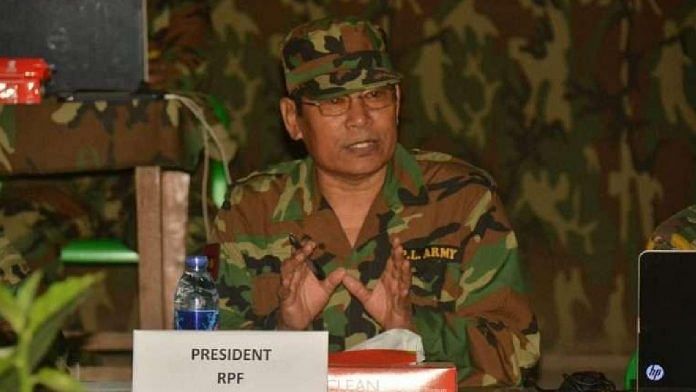Guwahati: One of Northeast India’s most elusive guerrilla leaders and proscribed outfit Revolutionary People’s Front (RPF) president Irengbam Chaoren, who believed it is “not possible to achieve freedom through peace talks”, died Friday. He was 65.
In a statement issued Saturday, RPF’s Deputy Secretary, publicity, Roben Khuman said that Chaoren died “after a brave battle against terminal brain tumour.”
The RPF is the political wing of one of the state’s most powerful armed rebel groups People’s Liberation Army (PLA), formed in 1978, to “liberate” Manipur. The RPF, established a year later, runs a government-in-exile in Bangladesh. PLA/RPF is among the several separatist insurgent groups in the Northeast that continue to reject the offer of talks with the government.
Defence analysts told ThePrint that some of RPF leaders operate from neighbouring countries like Bangladesh and Myanmar. Though it has not been ascertained where Chaoren died, national security analysts told ThePrint that he could have been in Mandalay, Myanmar in his last days. Chaoren led as the RPF president from 1990 till he breathed his last.
Also Read: As Chin families flow into Mizoram, a tale of hope & fear in refugee camps near Myanmar border
RPF & Chaoren’s journey
The PLA/RPF pledged to take up arms for the sovereignty of Manipur, representing the people of the state including the Meiteis, the Nagas and the Kuki-Chins. The RPF/PLA has been one of the few parties that has remained intact without splinter factions.
With its strength estimated at around 2,000 cadres, the PLA/RPF is one of the largest active insurgent groups in the Northeastern region, bordering China, Bhutan and Bangladesh.
Soon after the establishment of RPF, insurgency rose in the region, and in September 1980, the Manipur government declared the entire valley a disturbed area, and imposed the Armed Forces (Special Powers) Act (AFSPA), 1958.
On October 26, 1981, RPF along with People’s Revolutionary Party of Kangleipak (PREPAK) and Kangleipak Communist Party (KCP) were declared unlawful organisations.
A writer from Manipur, who did not wish to be named, told ThePrint that “there is no personification of an idol figure in the RPF and all that is known about Chaoren is through annual statements released in his (party president) name.”
From 1990, RPF imposed a ban on the sale of liquor in Manipur. PLA cadres launched an armed campaign against social evils. It took to enforcing total prohibition and gunning down rapists, besides launching a vigorous drive against drug peddlers.
Security experts say the outfit maintains alliances with the United National Liberation Front (UNLF), PREPAK as well as the National Socialist Council of Nagaland-Khaplang (NSCN-K), United Liberation Front of Asom-Independent (ULFA(I)), and the Kachin Independent Army (KIA) of Burma — groups operating in western southeast Asia (WESEA), the region including Northeast India, Bhutan, North Bengal and Myanmar.
Born on 2 November, 1957, Chaoren, who hailed from Khagempalli Huidrom Leikai in Imphal West, was also the convenor of a conglomerate called Coordination Committee (CorCom) formed in 2011 after coming together of seven armed groups — KCP, Kanglei Yawol Kanna Lup (KYKL), PREPAK, its Progressive faction (PREPAK-Pro), RPF, UNLF and United Peoples Party of Kangleipak (UPPK).
In February 2022, Chaoren reportedly said his outfit had no desire to enter into peace talks with India. His sense of betrayal by the government and anger against the Centre’s imposition of the AFSPA in Manipur, made him hostile towards the idea of peace-talks.
The RPF has been observing 25 February as Independence Demand Day since 1995. Chaoren, reportedly, said that peace talks were entered out of various compelling factors.
“We have seen the failed process of peace-talks and agreements fallen apart. We have seen the 9 Point Agreement of 1947, 16 Point Agreement of 1960 and the 1975 Shillong Accord between India and Naga revolutionary and more than six years old Framework Agreement, are meant to trade Naga’s freedom with some material benefits,” the Imphal Free Press quoted Chaoren saying, in his message to the people of Manipur on the occasion of Independence Demand Day.
“Under such a situation, it is not possible to achieve freedom through peace talks particularly in the WESEA region which India treats as their enemy by enforcing AFSPA and other draconian laws,” Chaoren had said.
Historian and writer Malem Ningthouja told ThePrint the RPF president’s death has led to questions on the future of the outfit. “His death must be a great loss to the party and other concerns. Some questions arise — will his death create a setback in causing the party to enter into a compulsive “peace” with the Government of India? Or will his death bring a change in leadership for a qualitative leap in party ideology, political principles, programmes, and actions? A future awaits,” said Ningthouja.
(Edited by Anumeha Saxena)
Also Read: Assam’s crackdown on child marriages leaves behind young women & sobbing children



